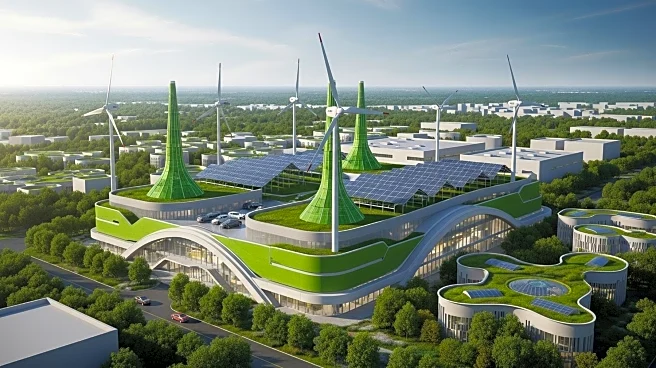What is the story about?
What's Happening?
The Climateworks Centre has released a report detailing strategies to decarbonize Gladstone's industrial sector, a key hub for heavy manufacturing in Central Queensland. The report emphasizes the need to replace fossil fuels used for industrial heat with low-carbon alternatives such as green hydrogen, biomass, and biomethane. It also highlights the importance of industrial energy demand management to enhance grid stability and reduce emissions. The report suggests that by 2040, Gladstone's industrial emissions could be reduced by almost two-thirds with a switch to low-carbon heat, potentially increasing industrial electricity consumption sevenfold to 36 terawatt hours per year. The report identifies barriers to deployment, including high costs and limited supply of low-carbon fuels, and presents case studies of best practices from other markets.
Why It's Important?
Decarbonizing Gladstone's industrial sector is crucial for Australia to meet its climate commitments under the Paris Agreement and ensure long-term economic resilience. The proposed strategies could significantly reduce emissions, enhance grid stability, and lower electricity costs for both industry and consumers. The transition to low-carbon manufacturing presents opportunities for regional prosperity and aligns with global shifts towards net-zero economies. However, overcoming deployment barriers is essential to realize these benefits, requiring coordinated efforts and strategic planning.
What's Next?
The report outlines targeted recommendations to facilitate the net-zero transition in Gladstone and similar industrial regions in Australia. These include financing and de-risking strategies to support industrial decarbonization and demand response programs to increase flexibility. Implementing these recommendations could accelerate the decarbonization of heavy industry and transform Australia's energy system, unlocking significant benefits for consumers across the grid.
Beyond the Headlines
The transition to low-carbon manufacturing in Gladstone could serve as a model for other industrial regions facing similar challenges. The report's emphasis on flexible demand and electrothermal storage technologies highlights the potential for innovative solutions to reshape energy landscapes and reduce costs. The successful implementation of these strategies could drive broader shifts in industrial practices and energy policies, contributing to global efforts to combat climate change.

















